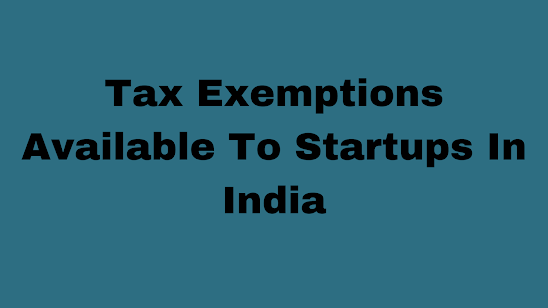Tax Exemptions Available To Startups In India
A 3-year tax break that lasts between 7 and 10 years (Section
80IAC Tax Exemption):
Tax holiday of 3 years for between 7 and 10 years (Section 80IAC Tax Exemption) Startups that were formed between April 1st, 2016 between April 1, 2016, and March 31, 2021, were eligible for the tax holiday. The budget for 2021 has been extended until 30 March 2022. Startups can claim an unlimited tax-free deduction for three years of a seven-year block provided that the annual profits do never exceed Rs.25 crores for any fiscal year. This will allow new entrepreneurs to meet their operating requirements in their first year of being in operation.
Tax exemptions on
long-term capital gain:
The new Section 54 of the EE has been included in the Income
Tax Act, 1961 so that entrepreneurs who are eligible can deduct tax on interest
earned over a long period of time if the is a long-term benefit, or a part of
it is put into a fund that is announced by the Central Government within six
months after the transfer of the assets. The most amount that could be invested
in a designated long-term asset is 50 lakh. This amount is placed in a declared fund for three years. If the money is withdrawn prior to three years the release
date will be canceled the year in which the money is taken out.
Tax exemptions
for investments that are fair value(Section 56 ) of the Income Tax Act, 1961):
The tax that is imposed by the government on investments
that are greater than the fair market value of eligible startups is
exempt. These investments are that are made by local angelic investors,
relatives, or funds that aren't registered to be venture capital-based
funds. Additionally, the investments made by incubators that exceed fair
market value are exempted.
Tax exemptions for Individuals/HUF on
long-term capital investments in equity shares of eligible start-ups:
The provisions
in the current law allow tax-free long-term gains made through the sale of real
property if the profits are placed in medium or small companies as defined in
the Micro, Small, and Medium Enterprise Act in 2006.
Thus, if an
individual is a person or HUF decides to sell residential real estate and then
invests in interest to be able to register 50 percent or more of eligible
shares, the long-term tax rate is exempt as long as the shares aren't
transferred or sold in the 5 years of purchase. The startup will also make
use of the funds invested to purchase the assets and will not transfer the
acquired asset within five years of the date it was bought. This exemption
encourages investments in the right areas and helps them grow and expand.
A suspension for any further capital gains and losses is permitted in the case of a change in the pattern of shareholding:
Further losses in respect of start-ups that are eligible for
the tax exemption are permitted in the event that all shareholders of the
company holding shares with voting rights which were in effect on the final day
of the year on which losses continued to hold shares until the day that ended
the year preceding, and the losses are continued. If the company is an eligible start-up the 51 percent hold
withholding of voting rights to remain unaltered as per Section 79 is exempted.
Start-up India
Program
Startups are business ventures usually for those who are
inexperienced and fresh with innovative ideas that may lead to lucrative
business opportunities.
This Startup India program aims to improve the quality of
handholding, funding assistance, and grants, as well as offering
government-backed start-up funds in India. It also facilitates education
and industrial cooperation as well as incubators. So far this Startup
India program has seen 26,619 new startups. In this instance the most
successful implementation came under the area of IT services, followed by
education and health sciences.
Eligibility for
the startups India
- Has not yet reached the ten-year mark of incorporation/registration
- Is it a private limited company or a partnership company or even a partnership with limited liability is it registered?
- It's not founded by tearing down or rebuilding an existing business.
- Has not exceeded Rs 100 crore in annual revenue in any financial year since incorporation/registration
- is involved in the development and development of products, processes as well as services. the scaleable business model that has excellent potential for job creation or the creation of wealth

.png)


Comments
Post a Comment